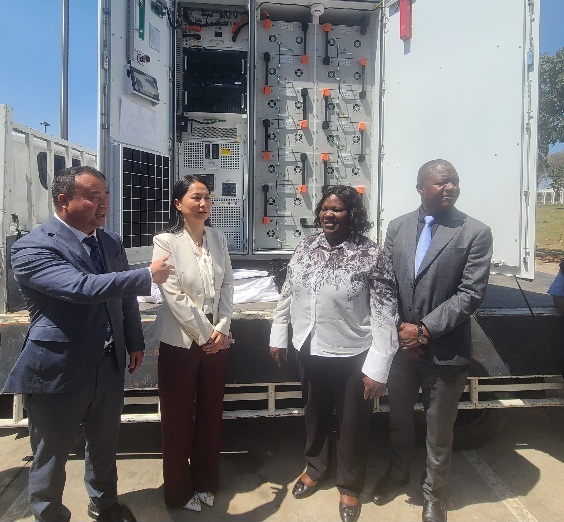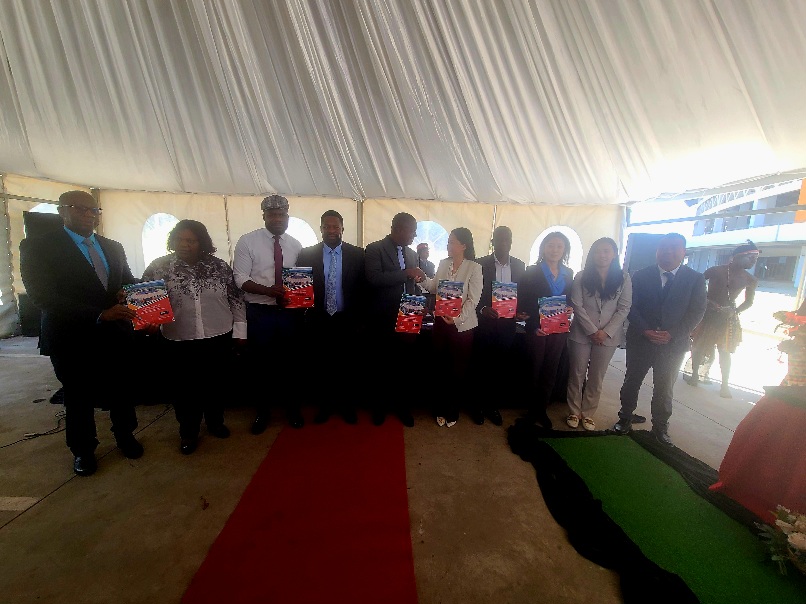Stadium Solar Deal to Power Communities
 Chikote says the 20MW new plants will supply households, small businesses, local townships, and help ease electricity shortages
Chikote says the 20MW new plants will supply households, small businesses, local townships, and help ease electricity shortagesBy Francis Maingaila
Lusaka, Aug. 21, 2025 – The Government of Zambia has signed a landmark memorandum of understanding (MoU) with Jiangsu Fanye Power Energy Equipment Ltd of China to install 20 megawatts of solar power at two of the country’s largest sports facilities, a move officials say will ease the nation’s electricity deficit, benefit communities, and empower young people with new skills.
The agreement, signed at Lusaka’s National Heroes Stadium, will see the construction of 10-megawatt solar plants each at Heroes Stadium in Lusaka and Levy Mwanawasa Stadium in Ndola.
Minister of Youth, Sport and Arts, Elvis Nkandu, said Heroes Stadium consumes only 700 kilowatts at peak, leaving most of the power to be redirected to nearby townships such as Matero, Mandevu, Kabanana, and parts of Kanyama.
A similar arrangement will apply at Levy Mwanawasa Stadium, with surplus energy supplied to Ndola communities near the stadium.
“These interventions will directly support households and small businesses that are struggling with load shedding.
Barbershops, salons, and other enterprises will benefit from reliable solar-powered electricity,” Nkandu said.
Nkandu stressed that beyond addressing Zambia’s power shortages, the project would empower young people through technology transfer.
“Zambian youth will be trained in advanced solar technology by our Chinese partners. This knowledge transfer will prepare them for the future and contribute to greening our economy,” he said.
He added that the initiative aligns with government climate goals, including the Ministry’s tree-planting programme targeting one million trees nationwide.
Nkandu praised Zambia’s six-decade relationship with China, describing the MoU as a milestone in bilateral cooperation that combines infrastructure development with youth empowerment.
“This agreement is another golden handshake between Zambia and China, one that will solarize our stadia, green our environment, and strengthen ties between our nations,” he said.

Energy Minister Makozo Chikote echoed this sentiment, thanking Chinese partners for their role in expanding Zambia’s energy mix. He dismissed critics opposed to such initiatives as “noise makers,” assuring citizens that government measures would soon ease the country’s electricity deficit.
Chikote said the 20MW new plants would supply households, small businesses, and local townships, helping to ease electricity shortages while supporting local enterprises.
“These solar projects will provide reliable power to communities, barbershops, salons, and other small businesses that have struggled with load shedding,” he said.
Chikote explained that Zambia’s power crisis has been worsened by droughts across Southern Africa, which reduced hydropower generation that accounts for 85 percent of the country’s electricity.
“This country has depended too heavily on hydro, but climate change has crippled our power generation. We must invest in solar and other alternatives to address the deficit,” Chikote said.
He added that while Heroes Stadium will use only about 700 kilowatts of its 10-megawatt allocation, the remaining 9.3 megawatts will be fed into the national grid for surrounding residents.
Chikote emphasized that energy security requires collective responsibility, urging citizens and businesses to consider rooftop solar investments to further reduce demand on the grid.
Managing Director of Jiangsu Fanye Power, Emmy Meng, described the agreement as “a new chapter” in Zambia’s energy development.
She said the firm would introduce solar systems, energy storage solutions, and transformer manufacturing technology while ensuring technology transfer to Zambian youth.
“This partnership is not only about technology, but also about creating jobs, building skills, and helping young people play a vital role in Zambia’s development,” Meng said.
The company, which holds international patents and supplies power equipment globally, pledged to work closely with Zambia to strengthen its power grid and accelerate the adoption of clean energy.
The solar power projects at Heroes and Levy Mwanawasa stadia are expected to enhance Zambia’s renewable energy footprint, strengthen local manufacturing capacity, and contribute to climate change mitigation.
Officials say the partnership will also position the country as a regional leader in sustainable power development.



Comments
Post a Comment